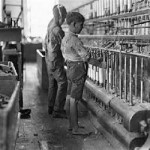Financial security is something we all dream of. When we dream of it, though, most of us think of two things. Lotto, and a ‘good job’.
How on earth did we get conned into believing that somebody else having control of our financial well being, in return for also taking control of our time and efforts, was not only a good idea, but the definition of security???
I once read a quote, and I wish I could remember where, that said there was one place where you had total security – never having to worry about anything – your time, your meals, your finances ever again – they were all controlled for you. It’s called: “maximum security”, and it’s someplace we send people WE don’t want to worry about anymore. So what’s the big attraction?
Jobs are a new invention, relatively speaking. Before the modern ‘job’ came along at the start of the industrial age, people mostly inherited the lands or trade that would take care of them financially – or if they didn’t, they apprenticed to a master in the craft they wanted, until they were good enough to go out on their own. At some point, they took responsibility for their own well being, and for ensuring their earnings either covered their needs or, ideally, expanded what they had to hand on down to their own children. The children, equally, were pretty sure that at some point they would have to do the same. Handing over the reins during an apprenticeship was only ever a temporary arrangement in return for being taught what they needed to know, to do the best job for themselves and their families down the track.
Then the factories opened, and they needed a workforce to staff them.  They paid minimal wages, in shocking conditions, and not surprisingly weren’t all that attractive an option for anyone that had prospects already. If you look into the history of the industrial age, you’ll see that the majority of workers were actually children.
They paid minimal wages, in shocking conditions, and not surprisingly weren’t all that attractive an option for anyone that had prospects already. If you look into the history of the industrial age, you’ll see that the majority of workers were actually children.
Children were employed for four simple reasons :
- there were plenty of them in orphanages and they could be replaced easily if accidents did occur
- they were much cheaper than adults as a factory owner did not have to pay them as much
- they were small enough to crawl under machinery to tie up broken threads
- they were young enough to be bullied by ‘strappers’ – adults would not have stood for this (http://www.historylearningsite.co.uk/factories_industrial_revolution.htm)
It’s not long after this that education became compulsory. Funnily enough, reading about the history of education, you’ll see that most modern educational systems are patterned after the Prussian one, which was founded “so as to produce more obedient soldiers and serfs” (http://en.wikipedia.org/wiki/Compulsory_education).
So looking forward from then to now, you have a steadily increasing number of a child’s formative years being shaped by a state (or federally) run system, which determines what the curriculum will be, but at the same time relies on the taxes of employed people and businesses to exist. Hmmm. Anyone thinking “conflict of interest” here?
If you ask me, taking responsibility for yourself and your own finances sounds a whole lot more ‘secure’ than constantly worrying about the next round of lay-offs, company or organisational restructures and national unemployment rates, forever wondering whether the ‘boss’ who has your financial well-being in their hands is about to throw you away.






 statistics, though, there’s a big drop off between those who start out to realise their goals and those who actually make it to living them.
statistics, though, there’s a big drop off between those who start out to realise their goals and those who actually make it to living them.


